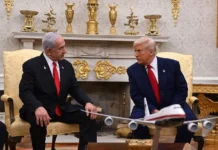Ha’aretz published a long and important article on April 12 that described an “unprecedented global boycott of Israeli academics.” Their report is based on a survey conducted in January by the Israel Young Academy, in which one-third of the 1,000 senior faculty members polled reported “a significant slump in their ties with counterparts abroad.”
This includes dis-invitations, rejections of academic work and lectureships, a demand that Israeli researchers’ names be removed as co-authors from papers that were already accepted for publication, a hostile, non-responsiveness to submitted papers, refusals to partner for grants with an Israeli academic, demands that Israeli authors either disavow their government, remove their affiliation with an Israeli institution, a demand that the Israeli author write about the plight of Gazans even in a scientific paper on another subject, suspensions of planned programs, being barred from conferences that are taking place in certain countries, etc.
If only this collective punishment of Israeli academics for their country’s alleged policies was “unprecedented.” But that is far from the case. What may be true is that a massive, pre-existing boycott has intensified.
Since 2001, Western academics have been calling for boycotts and the de-funding of Israeli academics. They have dis-invited Israeli scholars, fired Israeli academics, rejected university applications from Israeli students, refused to sell textbooks to Israeli universities, condemned Israel for massacres it had not committed and held individual academics responsible for these non-crimes/blood libels.
In 2002, leading anti-Zionist British academics responded to the ongoing war against the Jews by launching boycotts against Israeli academics. A total of 123 British academics published an “Open Letter” in The Guardian calling for a “moratorium” on all cultural and research links with Israel.
In 2003, when I published The New Antisemitism, I was contacted by at least 25 American professors who told me they were being harassed, ostracized and even threatened with termination for their too pro-Israel views. With their permission, I turned their emails over to an education editor at The New York Times. They were very interested in writing this story but were “stopped at the highest levels.”
In that same year, I dubbed the antisemitic intelligentsia “brownshirts.”
In 2004-05, for the third time in four years, the largest academic union in Britain—the National Association of Teachers in Higher and Further Education (NATHFE)—voted to blacklist any Israeli academic who did not publicly disavow the alleged “apartheid politics” of the Israeli state. The vote narrowly passed, but the organization dissolved, and this resolution was not binding on the successor organization.
Some 73 years after Adolf Hitler fired Jewish professors from German universities—and burned and banned Jewish books—British academics were leading the pack against Israelis.
The American Association for the Advancement of Science condemned the British boycott, as did one of my groups, the Scholars for Peace in the Middle East. We launched our own petition. Many who signed were professors of physics, medicine, math and computer science who were not as “politicized” as those in the social sciences and humanities. And many of them described the British boycott as “shameful,” “repugnant,” “indefensible,” “anti-academic” and “dangerous group thinking.”
By 2010, the leading British journal of medicine, The Lancet, published a scurrilous article that blamed indigenous gender apartheid practices (wife-beating, etc.) among Middle Eastern Arabs on the so-called “Israeli occupation.” Their so-called study was funded by the Palestinian National Authority and was collected by the Palestinian Central Bureau of Statistics. No control group based in Egypt, Jordan or Saudi Arabia (where similar violence against women was normalized) was used. The Lancet did it again in 2014, by publishing an Open Letter that accused Israel-only of crimes it had not committed. This letter had also been funded by known Palestinian terrorist organizations.
The Lancet has long been viewed as a distinguished journal of science. Increasingly, their work descended into political propaganda which, no doubt, has influenced (or bullied) the coming generations.
Recently, I have been told about some authors in the West who were discouraged from writing—or submitting—anything “Jewish,” be it about Judaism or Israel. Publishers are shying away from this topic.
This is where it all started—in the academy. It influenced two or three generations of professors and students, journalists and international organizations, and is now flourishing in the streets, jihad-style, at loud and aggressive anti-Israel demonstrations all across America and Europe. Cheers for Iran after it attacked Israel with missiles and drones. Remember, there were similar shouts of joy for the Hamas demons on Oct. 7.
I must note that each successive wave of Israel-blaming took place when the Jewish state was under attack and fought back to save itself. That is again the case now.
























